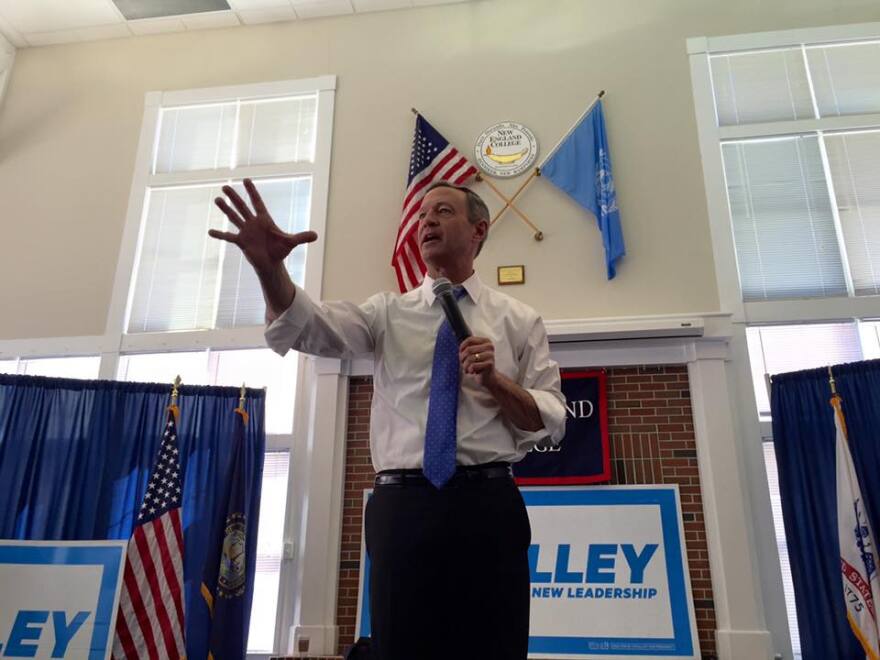It's no coincidence that Democratic presidential candidate Martin O'Malley has campaigning harder in Iowa than in New Hampshire.
For a campaign that continues to lag in the polls, he's counting on the Iowa caucus changing the dynamic of what has essentially become a two-person race.
"Once the voters start to vote, that usually changes the dynamic. Not always, but usually. And the first state that comes up is Iowa, so that’s what we’re focused on," O'Malley said during an interview with NHPR's Morning Edition.
The latest UNH Survey Center poll shows O'Malley with just 1 percent support among Democratic primary voters. That same poll shows Vermont Sen. Bernie Sanders at 60 percent, and former Secretary of State Hillary Clinton at 33 percent.
Here's the full text of O'Malley's interview:
How have the crowds been for you? What are you hearing from people as you talk around the Granite State?
The crowds have been very good. The two phrases I hear again and again from people are the phrases “new leadership” and “getting things done.” There’s a sinking sense out there that we’ve lost our capacity to govern ourselves and to find common ground. Whenever Americans face this sort of stalemate, they look for new leadership to break through it. I’m not part of the Washington establishment of the last 20 or 30 years. I bring an entrepreneurial, mayoral perspective to leadership. I believe as people are only now tuning into this race, I believe we’re going to pick up support.
Let’s talk about electability. In a UNH poll this week, 26 percent of Democratic voters said they would not vote for you. That’s up from 11 percent last month, so obviously not the direction you’d want to see.
You’ve spent a lot of time here, so what’s not working that you could change in these final couple of weeks?
We’ve actually spent a lot more time in Iowa than we’ve spent in New Hampshire so far. The caucus has a dynamic to it that is very different than a primary. There’s rarely ever been a time when the polls predicted what happens on caucus night. I’m not the candidate of big money; never have been. I’m not the candidate of Wall Street. Candidates offer their candidacies, and then the people decide. We’ve never had a year where we’ve never answered the Republicans in a prime-time debate. That’s a first. So that creates challenges for challengers even greater than usual. But I’m looking forward to these next few days. I’m going to offer my candidacy and let the people decide.
Let’s talk about those debates. You’ve been critical and others have as well of the scheduling of those debates. Can you tell me a little bit more about how you see it?
I thought we did very well in the last debate, even with the rigged, manipulated formats and hiding the ball on weekend nights. We’ve punched through in a couple of those debates, even with the rules such as they are. I thought the last debate was very good for me and for the candidacy that I have to offer the people. There’s one more town hall and the people of Iowa and New Hampshire always make up their minds in the last stretch of the race, understandably. They want to see the race play out before they make a decision.
On issues like health care, the economy, and national security, do you feel like you’ve been able to put some distance between yourself and your opponents to give voters a sense of how you would be different in the presidency?
To some degree I have, and to others, I have not. The biggest difference between myself and my opponents is that my background is that of a governor and a mayor and actually getting things done. On health care, I do disagree with my two opponents. We’ve put forward in our own state and all payer system. We have been reducing the cost of health care. We have been aligning our profit incentives with wellness, rather than filling up hospital beds in big institutions and it’s actually working. According to the New England Journal of Medicine, Maryland’s moved to an all payer system, moving all 46 of our acute care hospitals from fee-for-service to global payments. It’s actually one of the boldest reforms ever to take place in our country and that’s what every state needs to do.
Realistically for you now, what needs to happen? You’ve got an idea that maybe the Iowa caucus could shift the dynamic, but what do you need to do here in the Granite State?
The primary season rolls out one state at a time. Once the voters start to vote, that usually changes the dynamic. Not always, but usually. And the first state that comes up is Iowa, so that’s what we’re focused on. I recall in 1983, Gary Hart was at 5 percent in the first week of January and he went on to win New Hampshire. We’re focused on beating expectations in Iowa, and then coming here to New Hampshire and rolling on through the rest of the primary process and hopefully having more debates along the way.









